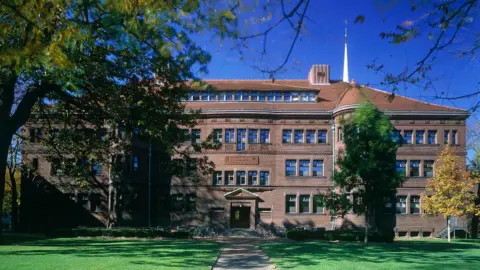US charges three researchers with lying about links to China
 Getty Images
Getty ImagesThe US has charged a Harvard professor and two Chinese researchers based in Boston with assisting the Chinese government.
Harvard department chair Charles Lieber is accused of lying about his connections, while the researchers were charged with being foreign agents.
Mr Lieber allegedly accepted more than $1m in grant money from the Chinese government.
Harvard University called the charges against him "extremely serious".
In a statement, the university added: "Professor Lieber has been placed on indefinite administrative leave."
Who else was charged?
Prosecutors said Yanqing Ye, a Boston University robotics researcher, concealed the fact that she was in the Chinese army.
Ms Ye is accused of falsely identifying herself as a student and also continuing to work for the People's Liberation Army, while completing a number of assignments in the US.
Cancer researcher Zaosong Zheng was arrested at Boston Logan International Airport with 21 vials of biological samples in his bag. Prosecutors allege he was planning to return to China to continue his research there.
What were the alleged connections?
Court documents allege Mr Lieber, who has worked as the head investigator at the Lieber Research Group at Harvard University, received more than $15m (£11.5m) in grants from the US National Institute of Health and the US Department of Defence.
Recipients of these grants have to disclose any conflicts of interest, including financial support from foreign governments or organisations.
However in 2011, allegedly without Harvard's knowledge, Mr Lieber joined Wuhan University of Technology in China as a scientist.
According to the court papers, he also participated in the Thousand Talents Plan, a programme that aims to attract foreign research specialists. The US has flagged the programme as a security concern in the past.
From his role at Wuhan University of Technology, Mr Lieber was given a monthly salary of $50,000, in addition to living expenses of up to $158,000.
The filings say he was also given more than $1.5m to establish a research lab at Wuhan University of Technology and, in return, was expected to work for the university, applying for patents and publishing articles in its name.
The court filings claim Mr Lieber failed to disclose this information and during an interview with investigators, lied about his involvement in the Thousand Talents plan and his affiliation with the university in Wuhan.
Andrew Lelling, US attorney for the district of Massachusetts, said in a press conference: "This is a very directed effort by the Chinese government to fill what it views as its own strategic gaps."

'Hysteria' or 'non-traditional espionage'?
By Zhaoyin Feng, US Correspondent, BBC Chinese
China says its Thousand Talents Plan is designed to keep "high-end talent" at home, in order to prevent a brain drain. The country has been losing talent to places like the US and the UK, where hundreds of thousands of Chinese attend top universities and subsequently settle down.
But the US view is that China is repeating a notorious tactic in its development playbook: intellectual property theft. For decades, Washington has accused Beijing of stealing science and technology from the US in order to gain an competitive advantage.
The FBI warns that the Thousand Talents Plan could be used by Beijing as a channel to conduct "non-traditional espionage", though many reported cases are not related to spying, but violations of ethics, such as not fully disclosing financial conflicts of interest.
Washington has increased its scrutiny on China's Thousand Talents Plan since 2018, when the two countries started to be locked in a trade battle, and Beijing has reportedly refrained from talking publicly about the program.
Chinese state tabloid Global Times labelled the American scepticism as "hysteria".
Since 2008, more than 7,000 researchers and scientists based outside of China have participated in the Thousand Talents Plan, many of whom are of Chinese descent.
Many warn that Washington's crackdown efforts must not give way to racial profiling. David Ho, a renowned Taiwanese-American HIV researcher, suggested in an earlier media interview: "If you want to implement policies, you should implement for all, not just the Chinese scientists."
